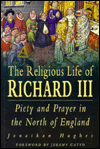

 |

|

The average rating for The religious life of Richard III based on 2 reviews is 3 stars.
Review # 1 was written on 2020-09-24 00:00:00 Christophe Moreau Christophe MoreauActual vote: 3.5 This book has many interesting notions. It explores in details the piety and personal beliefs of Richard III. So we learn about his strict morals, his aversion for sins, especially adultery and fornication; his sincere piety, not merely a show, but a deep belief and devotion. The part about the religious tradition of North of England was very detailed and interesting. Unfortunately the author starts from the assumption Richard is actually guilty of all the crimes Tudor propaganda bestowed on him, even the ones already and definitively disproved, such as the murder of his wife, of Edward of Westminster and the desire to marry his niece. About the others, George of Clarence and Henry VI were killed at the orders of Edward IV, so the only "crime" one may actually speculate about is the fate of the so called "Princes in the Tower". In fact the author struggles to reconcile the man of piety and faith he depicts to the muderous monster he can't let himself to let go. Apart from that, if one is able to leave out the author's personal assumptions, the fact remains that this is a very interesting and well researched book, providing a lot of informations about medieval religious way and Richard III's personal and strong morals and piety. |
Review # 2 was written on 2019-07-06 00:00:00 Girlie Viray Girlie VirayThe Religious Life of Richard III, by Jonathan Hughes The other night I began reading "The Religious Life of Richard III" by Jonathan Hughes, knowing up front that it is very negative towards Richard. But I was also told by some others who had read the book that it provides some interesting information about religion and mysticism as practiced in northern England, so I figured I'd give it a try. Besides, I already bought it so might as well at least browse through the interesting parts. On the very first page author says in no uncertain terms that he believes Richard III to be guilty of, or least implicated in, all the crimes he's been accused of, even those which have been debunked by most modern historians. He even goes so far as to say Richard poisoned his wife, Anne Neville (even though chroniclers state that he was cautioned by his physicians to avoid her chamber because of fear of contagion!) and wanted to pursue an incestuous relationship with his niece! Ewww! I shook my head and rolled my eyes...and moved on. Another section that sticks out to me is where the author is analyzing the clothing and hat pins Richard is shown wearing in his portraits, presenting these as proof for whatever mystic religious connection he is trying to make. Now, it is possible that clothing can in some instances provide clues as to a person's religious beliefs, but not one of the existing portraits of Richard was painted during his lifetime! All of the portraits we have today were painted years after his death. They may have been based on originals from Richard III’s lifetime, but those originals disappeared long ago – probably tossed out with the trash shortly after August 22, 1485. Being that these portraits are copies, I can't help but wonder how accurate they are, especially when it comes to clothing and colors. And even if they are, how do a dozen or so copies accurately portray how Richard dressed? Might not some decisions when it comes to color be the artist's choice, and not the subject's? Especially since the subject is long-dead? When the author started going on about the hat pins and how their shape and color represented some mystic cruciform symbolism, I muttered to myself, "And here I thought the colors represented the murrey and blue Plantagenet colors!" Naturally, I had to see if I could find out anything more about this author. I couldn't find a lot online about him but what little I did suggests that he is into Medieval alchemy and mysticism. I came away with the impression that while his research and history is extensive, his conclusion often appear to be faulty – at least according to this lengthy analysis of one of his books that I found: As for religious beliefs, simply looking at someone's books may tell us a lot...but it doesn't necessarily tell us everything. I, too, have many books on religion on my shelves, but that doesn't mean I believe everything in them. Perhaps, like me, Richard's piety was mixed with a healthy dose of curiosity. I don't know what was really in Richard III's mind, and I doubt if the author does, either. It was an interesting read, and I did learn more about religious mysticism as practiced in Richard’s lifetime, but I ended up questioning many of the author’s conclusions. |
CAN'T FIND WHAT YOU'RE LOOKING FOR? CLICK HERE!!!